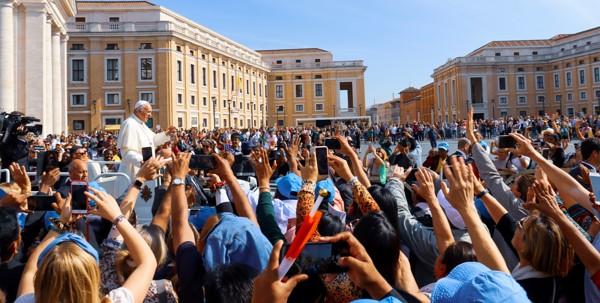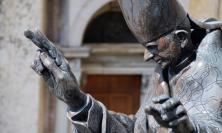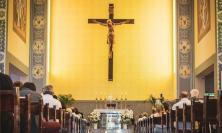Pope Francis’ third encyclical ‘poses an incremental expansion of the tradition of Catholic Social Teaching which carefully lays bare its logic and gently radicalises some of its implications’, writes Damian Howard SJ. In Fratelli tutti, how does the pope respond to a confused and troubled world which is struggling to articulate a vision for its future, with a gospel-centred narrative which is both practical and ambitious?
Catholic Social Teaching just keeps coming these days. That should be no surprise at a time of such upheaval. Only five years ago, in what seems like a different world, Laudato si’ prophetically placed the ecological crisis centre stage for the Church and the world. The enormous agenda that teaching document mapped out seemed at the time more than enough to be getting on with. Since then a whole new vocabulary has come into being, expressive of a set of new social and political challenges: Brexit, MAGA, Covid-19, BLM, fake news, lockdown, cancel culture, QAnon … Pope Francis is surely right to think that a confused world urgently needs some Catholic common sense, and that is precisely what Fratelli tutti provides.
Politics today functions across the globe as if there were only two visions for the future of humankind: to persevere with the four decades-long project of neo-liberal economics, with its succession of ever-deeper economic and debt crises, its austerity regimes and the cold, technocratic globalisation that is so rapidly erasing cultural differences and empowering a new class of the super-rich; or to resist all that by promoting national populisms of various sorts which foment propaganda, talk of empowering ordinary people against the social, financial and educational elites and their ridiculous ‘woke’ concerns, but all the while colluding with corrupt financial interests. We are told it’s a choice between Fox News and a hundred new gender pronouns.
It doesn’t take too much effort to realise that this dichotomy is a mirage. These are only the noisiest and laziest options on offer, the easiest to caricature – and to communicate in a tweet. In many ways, they are two sides of the same coin. But they pose a problem. As the recent US presidential debate (which was neither presidential nor a debate) showed, politics in some parts of the world are getting very close now to mutually assured destruction, so powerful is the toxic effect of this incessant antiphony.
A not-unusual Catholic move to make in such a situation is to try to locate on each side some reflection of a resplendent truth and then to see if, instead of insisting on the ‘either-or’ of binary opposition, there might in fact be greater wisdom in a ‘both-and’ approach. And this is precisely what this long encyclical, the third of Pope Francis’ pontificate, sets out to do, sketching out in the process a vision that is conscious of its own ambition and yet intensely practical.
‘Liberal’ has become a dirty word for millions of people the world over whose every instinct is in fact liberal. The Enlightenment vision of a society founded on the principle of the freedom of individuals has combined with an economic orthodoxy committed to the ideal of the universal operation of free markets as the most effective way of distributing goods, to create a powerfully attractive model for the organisation of human relations. Most of us who inhabit the rich countries of the world would find any other way of being quite intolerable, even though its shortcomings are so tangible: painful inequality, banal materialism, the lack of any shared vision of the good life to unite us...
Yet the value of liberal culture does not simply boil down to a taste for creature comforts and a life of do-as-you-please. There is a nobility to the story of the post-war efflorescence of human rights, to the spread of the rule of law across the globe, to the many international institutions which have been put in place to safeguard the common good, and to the shared disgust aroused by the Shoah and the war-time use of thermonuclear weapons which crystallised an appetite for racial equality and peace. And the Church has always seen these things and valued them, even if she has also been only too aware of the flaky underpinnings of liberal theory.
In Fratelli tutti, the very liberal-sounding idea of universal fraternity is put into dialogue with the gospel message which points so strikingly in the direction of the brother- and sisterhood of every human being. A more triumphalistic pontiff would have insisted that the gospel was the ultimate source of all that is good in the Enlightenment, including its vision of human equality. But Francis does not play those sorts of games, preferring instead to scratch his head in disbelief at how long it took the Church to realise that slavery and Christianity were incompatible (§86).
Essentially, Francis believes that the gospel can give a soul to the idea that we are bound to respect one another’s inherent dignity, to work for a society in which everyone is included and for an international order in which cultural and other differences are sources of enrichment rather than resentment. The liberal vision on its own is dry, formal and abstract. It over-reaches itself when it envisages a universal civilisation of peace because it leaves love out of the picture, and love is the only thing that can bring the liberal virtues to life. The love of humanity in general, as Dostoyevsky pointed out, all too readily cohabits with a scorn for the real, flesh-and-bone human beings who surround me.
The fact that so many who would gleefully class themselves as ‘global citizens’ do not get beyond merely proclaiming universal human dignity is what makes them sitting ducks for ridicule as bourgeois virtue-signallers, woke adolescents, self-serving hypocrites whose progressive opinions serve little function other than to make their hearts feel warmer than they are. And it’s that jeering critique of a ‘globalisation’ at the beck and call of a disingenuous elite which today sustains a whole series of movements, more or less inchoate, which seek to bring an end to the liberal project and to put something more sinister in its place. Francis is keenly aware of the dynamics at play here and the complex way in which righteous indignation fuses with malign opportunism to create modern day populism, a phenomenon he finds as distasteful as soulless, technocratic liberalism.
But if universal love is to be more than a pious soundbite, one is entitled to ask what it looks like in practice and how one learns to act on it. In answer to the first question, Pope Francis offers one parable and two Christian lives. The parable, of course, is that of the so-called Good Samaritan, which is the scriptural heart of the encyclical, carefully read in chapter two, ‘A Stranger on the Road’. The two lives are those of Francis of Assisi and Charles de Foucauld, the nineteenth century founder of the Little Brothers of Jesus, both radical men of God whose missionary activity notably included outreach to the Muslim world.
Most of the encyclical is an answer to the second question: how do we become practitioners of a universal love? It is not a question our civilisation often asks. Francis thinks that it has to be worked at, it doesn’t just happen of itself. It is definitely not just a matter of being nice. We have to be formed by our family and educated into the practices and virtues of universal love. But where to begin? Francis’ Catholic ‘both-and’ strategy enables us to see that the actual starting point for the journey into universal love is our learning first to love our own roots, our own culture, our own homeland, in short to become a happy member of a people.
But isn’t this precisely the trap of populism and nationalism? Not at all. A true love of such things does not close us off from the universal horizon but actually blossoms into a concrete universal love appreciative of other ways of being human. It’s a corruption of my sense of being part of a people that turns it into an exclusive identity. Taking a swipe at the modern Catholic followers of Carl Schmitt, Francis says that other cultures ‘are not “enemies” from which we need to protect ourselves, but differing reflections of the inexhaustible richness of human life.’ (§147)
The rest of the encyclical could be said to flow from that insight which gives not so much radical novelty but a new edge to aspects of Catholic teaching. Social teaching, for example, has previously affirmed both the so-called universal destination of goods and the right to private property. But this passage is stark enough to ensure that it will not go down well in some parts of the Church:
The right to private property can only be considered a secondary natural right, derived from the principle of the universal destination of created goods. This has concrete consequences that ought to be reflected in the workings of society. Yet it often happens that secondary rights displace primary and overriding rights, in practice making them irrelevant. (§120)
A large section of the encyclical is devoted to the plight of refugees, and ‘the right of all individuals to find a place that meets their basic needs and those of their families, and where they can find personal fulfilment’ (§129). There is also a powerful treatment of the duty to remember the horrors of human history: notably the Shoah, Hiroshima and slavery (§247f). Memory of such things, Francis points out, is an essential component of social and political love.
Those who truly forgive do not forget. Instead, they choose not to yield to the same destructive force that caused them so much suffering. They break the vicious circle; they halt the advance of the forces of destruction. They choose not to spread in society the spirit of revenge that will sooner or later return to take its toll. Revenge never truly satisfies victims. Some crimes are so horrendous and cruel that the punishment of those who perpetrated them does not serve to repair the harm done. Even killing the criminal would not be enough, nor could any form of torture prove commensurate with the sufferings inflicted on the victim. Revenge resolves nothing. (§251)
From there, the pope segues to his recent modification of the Church’s official teaching on the death penalty so that the Catholic position now is to rule it out entirely. The logic for this – the inalienable human dignity even of murderers – is carefully articulated towards the end of Fratelli tutti, in tandem with an ominous condemnation of war. These will be controversial passages for some. Anyone who thinks such positions platitudinous has not been paying attention to the increasingly startling views of those Catholic pundits who view neo-liberal economics – and US foreign policy – as the optimal implementation of Catholic Social Teaching.
Many of Pope Benedict XVI’s concerns are echoed in clear continuity with his social encyclical, Caritas in veritate (2009), after Laudato si’ the second most cited document in the whole letter: the importance of attending to a new global political order (§138), of social action governed by the logic of gift (§139), and of combining private charitable action with political effort to change social structures (§187). But Francis has his own personal touches to bring to the tradition. He stresses the importance of meeting others, of creating a culture of encounter in which we really get to know each other in all our complexity. In the era of Covid that sounds as desirable as it is – temporarily, we hope – impossible to realise. He is committed to the notion that being human means being part of a people, an altered populism, if you like, with its own ‘mythic’ character (§158). He envisages the inclusive society as ‘polyhedral’, respectful, in other words, of categorical difference and abstaining from the imposition of homogenising frameworks (§215). And his desire for understanding between Christians, Jews and Muslims frames the whole document, peppered as it is with references to the Document on Human Fraternity for World Peace and Living Together which he and Ahmed el-Tayeb, the Grand Imam of al-Azhar, signed in Abu Dhabi last year.
With much else worthy of exploration and meditation, from kindness to concupiscence, from religious freedom to forgiveness, this letter poses an incremental expansion of the tradition of Catholic Social Teaching which carefully lays bare its logic and gently radicalises some of its implications. But its real value is its coherent reiteration of the essentials of the gospel message at a time when so many of us, for good reasons and bad, risk becoming fatally distracted by non-essentials. When Pope Benedict wrote his first encyclical, Deus caritas est, in 2005, he wanted to focus on the central tenet of the faith, to give the People of God that ‘back to basics’ summons which we, the Church’s daughters and sons, need every now and again. The proof of the need for such a call will be the plentiful online venting of spleens which Fratelli tutti is almost certain to provoke, either by virtue of its title or its trenchantly ‘left-wing’ positions. Let’s hope that once the storm has subsided it will help some of the Church’s vitriolic commentators to stand back for a moment from their vicious name-calling, in most cases a habit only recently acquired, and to ask themselves how a life ostensibly devoted to universal love and reconciliation could ever have come to such a pass.
One of the complaints sometimes levelled at the teaching of the Second Vatican Council is that it is redolent of the hippy-dippy optimism of the 1960s. The author of Fratelli tutti is well aware that his idealism, his dream of a new culture of universal love, his confidence that the obstacles to world peace can be faced down, all guarantee that he will be charged with an unseemly naivete. Yet no-one, not even his fiercest detractors, can accuse him of hitching himself to the optimism of the age. This is an encyclical for tumultuous times, for a pandemic wrapped inside a financial crisis encased in impending ecological catastrophe. But the roadmap is sober and practical, if seriously challenging:
We can start from below and, case by case, act at the most concrete and local levels, and then expand to the farthest reaches of our countries and our world, with the same care and concern that the Samaritan showed for each of the wounded man’s injuries. Let us seek out others and embrace the world as it is, without fear of pain or a sense of inadequacy, because there we will discover all the goodness that God has planted in human hearts. Difficulties that seem overwhelming are opportunities for growth, not excuses for a glum resignation that can lead only to acquiescence. Yet let us not do this alone, as individuals. The Samaritan discovered an innkeeper who would care for the man; we too are called to unite as a family that is stronger than the sum of small individual members. […] Let us renounce the pettiness and resentment of useless in-fighting and constant confrontation. Let us stop feeling sorry for ourselves and acknowledge our crimes, our apathy, our lies. Reparation and reconciliation will give us new life and set us all free from fear. (§78)
What is the source of such vision and encouragement at a time when hope seems impossible to come by? Whence the confidence in ordinary human goodness to send us all back to our families, to our neighbourhood and towns to work humbly wherever we are for the global common good? The answer is, of course, Francis of Assisi:
In the world of that time, bristling with watchtowers and defensive walls, cities were a theatre of brutal wars between powerful families, even as poverty was spreading through the countryside. Yet there Francis was able to welcome true peace into his heart and free himself of the desire to wield power over others. He became one of the poor and sought to live in harmony with all. (§4)
The profound spirituality of il poverello is palpable throughout Fratelli tutti. That, I imagine, is why the title, a quotation of the saint, has endured in spite of valid objections to sexist language in ecclesial texts. It’s the key that holds together the lure of a simple life, universal love and openness to Muslims. The multi-faceted revolution which Francis and his new order brought to the Church of his age was so steeped in the spirit of the poor Christ that it sparked off expectations that a new age of history was at hand. The name ‘Francis’ which the then Cardinal Bergoglio chose on accession to the See of Peter may not, it turns out, stand for a mere programme of ecclesial reform so much as offer a window onto a mystery of providence. Perhaps the Jesuit pope is refining the famous final paragraph of Alasdair McIntyre’s After Virtue (1981). What we have been waiting for is not a Godot but another – doubtless very different – St Francis.
Damian Howard SJ is the Provincial of the Jesuits in Britain.






